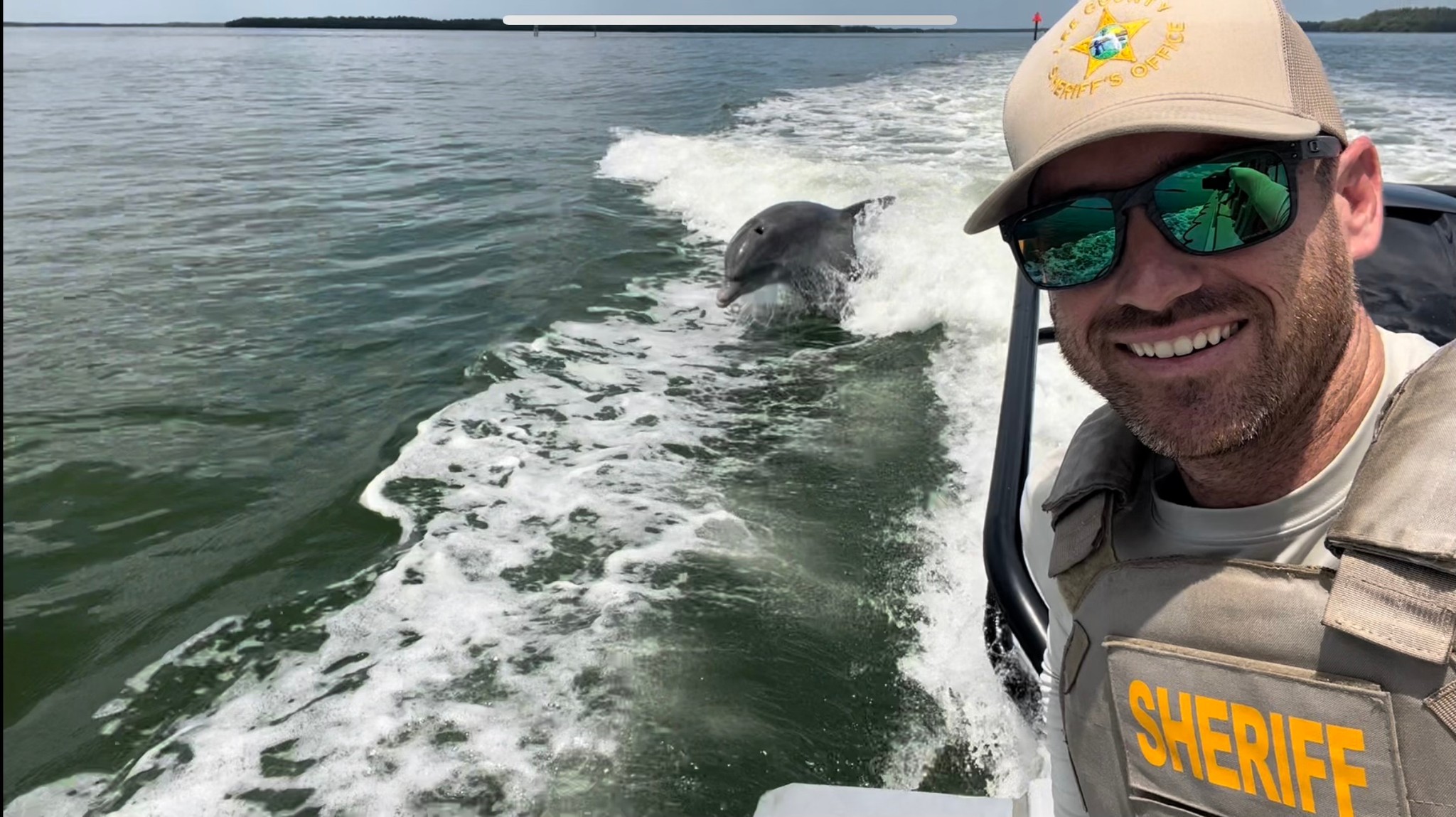
With the deluge of rainwater dumped on South Florida during a massive storm recently, the law enforcement officers assigned to respective agency Marine Patrol units throughout the coastal region were activated beyond imagination, plucking people and pets from homes and surveying boats that took on plenty of water.
This material looks at specially trained cops certified in the ways of water safety and marine enforcement principles.
Going over some of the footage posted online, one first responder cited that 25 inches of rain fell within 15 hours. He activated his boat and saved several citizens from further devastation, repeating the cycle after refueling his maritime vessel.
That activity was played out countless times equating to significant saves by various LEOs patrolling waterways (and submerged streets, in some surreal circumstances) in police-marked crafts operated by cops who are pseudo captains without the official customary gold bars.
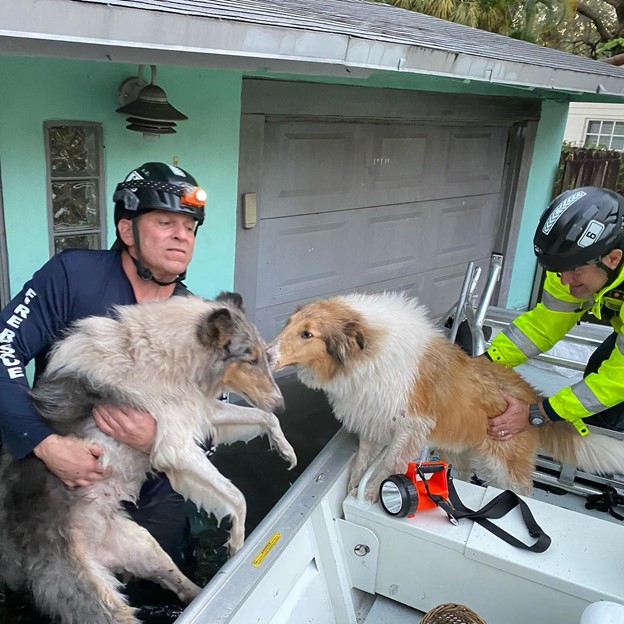
(Photo courtesy of the Broward County Sheriff’s Office.)
LEOs operating a police cruiser on the dry, stable ground have the advantage of reverting to options when situations arise, calling for cover and concealment, etc. Marine Patrol cops are at the mercy of Mother Nature regarding various threats posed by turbulent tides and inclement weather no one can control.
As always, training…training…training is paramount.
My department’s Marine Unit deploys their boats in Tampa Bay waters (safeguarding festive holidays such as Independence Day, the Gasparilla Festival involving pirate ships shooting cannons, et al., when boat traffic soars). In the rivers and tributaries, despite some shallows, dangers are always omnipresent. We’ve seen curious nature-seekers aboard tiny boats get wedged in the weblike mangroves due to tides pushing them into tight squeezes, as tugboats do with ships. Water rescues are common, hence the need for Marine officers patrolling, with eyes peeled.
As a police intern (criminology studies in college) many moons ago, I boarded one of the police vessels and received vast exposure to what Marine Patrol officers do and how they operate and perform on swirling bodies of water.
It didn’t take long to realize that gaining respect for authority and compliance with maritime rules and regulations was stratified among boaters. Can’t just walk away and ignore cops conducting lawful duties, like boat safety checks (life jackets, fire extinguishers, sound-making devices, boat registration/proper display of stickers otherwise known as “hull numbers,” identification, functional lights).
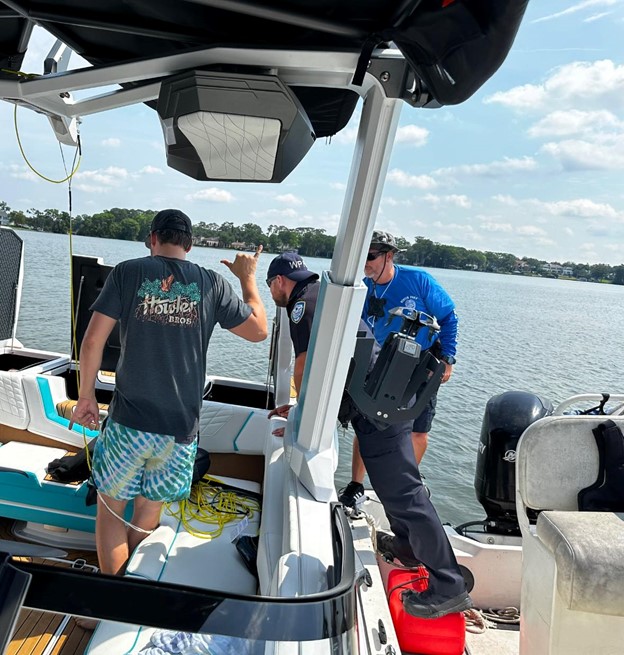
(Photo courtesy of the Winter Park Police Department.)
But arresting someone upon swirling bodies of water has its tricky tactics. In observation mode, I wondered what would happen if a physical fight broke out, by a person resisting arrest, or because liquid courage influenced stupid signals to go head-to-head with law enforcement.
Typically, the arrest is for BUI (boating under the influence), but we found many boaters had warrants with their names on them (some for failing to appear in court regarding charges such as fishing without a license).
In any case, a careful measure of always observing what the suspects (and accompaniments) are doing is challenged by maintaining balance countered by the water’s movements, rocking the boats and everyone in them.
Once that precarious dance is settled and the arrested party is on board a police craft, the trek back to docks and boat launches engenders careful operation of the vessel and utmost security of the arrested individual, whose vulnerability is heightened due to being handcuffed and wobbled by the craft’s churn through busy currents and changing tides. This is why you’ll likely never see only one cop piloting a police boat; typically, you’ll see at least two Marine unit officers per craft.
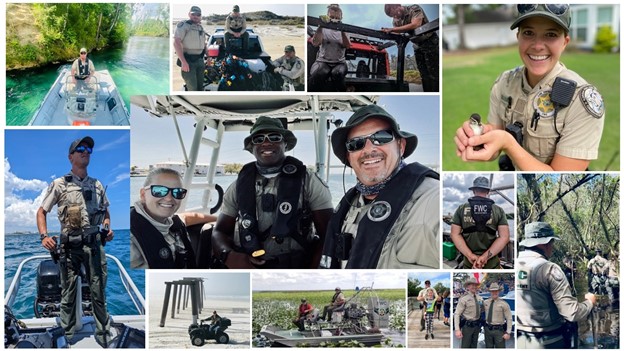
(Photo courtesy of the Florida Fish and Wildlife Commission.)
Making it to dry land in one piece and with all heads accounted for, police cruiser transports are prearranged via radio, with a street cop waiting to help tether the boat and take custody of the arrested party. Then, the primary officer who effected the arrest —in this case a Marine Patrol cop— completes a Criminal Report Affidavit (CRA) scripting what led to investigations and pursuant custodial responsibilities. After that, it’s off to county jail for the arrestee…while the Marine Unit officers return to patrolling the water (reports are completed once dockage is done).
For marine patrol cops, navigation is different than land-ho colleagues in cruisers. Maritime coordinates are used to mark locations and convey to public safety dispatchers where they are in often-vast bodies of water, providing precise markers involving longitude/latitude. It is also a way for various law enforcement agencies deploying Marine Patrol vessels to know jurisdictional boundaries and primary responsibility for whatever requires police attention.
In my region, the bodies of water are so large that massive bridges span over them. On these bridges are signs denoting where one county line meets another, like our nation’s border demarcations symbolizing sovereign reign of government. The bridge’s signage denotes jurisdictional boundaries shared by three counties, all supplemented by state police agencies, the U.S. Coast Guard, and the U.S. Department of Homeland Security marine unit officers.
Much of the maritime training and certifications required to manifest Marine Patrol operators are provided by the U.S. Coast Guard, its personnel teaching optimal tactics to implement law enforcement at sea (or any body of water where boats are deployed). In fact, after launching our Marine Unit, the Coast Guard facilitated (donated) our first boat, helping us offer waterborne public safety assets.
Given that Florida is mostly enveloped by water, flanked by the Atlantic to the east and the Gulf of Mexico to the west, there is an abundance of coastal cops working for law enforcement agencies. In that context, the Florida Keys are a bunch of tiny islands inhabited by maritime enthusiasts, thus police agencies down near the United States’ so-called “most southern tip” are all about Marine Patrol assets.
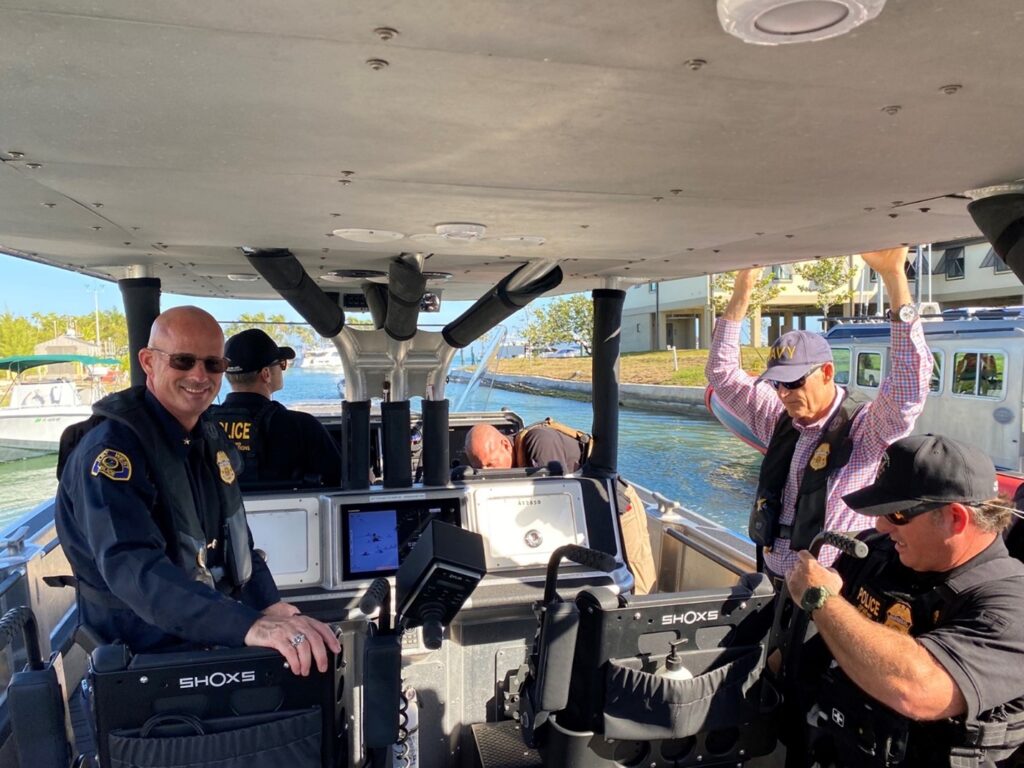
(Photo courtesy of the Key West Police Department.)
Hurricane season is a nailbiter for the men and women safeguarding waterways.
Statutorily, all cops are subject to respective state Criminal Justice and Training Standards Commission mandates outlining in-service training modules to galvanize tactics and strategies and officer safety principles. In other words, Marine officers are also going to endure all land-based training equal to their surface-street counterparts. You never know. And Marine officers can and do change roles from time to time.
The Los Angeles Port Police has a Maritime Tactical Team (MTT) whose members train in structures within their jurisdiction’s environment, such as warehouses.
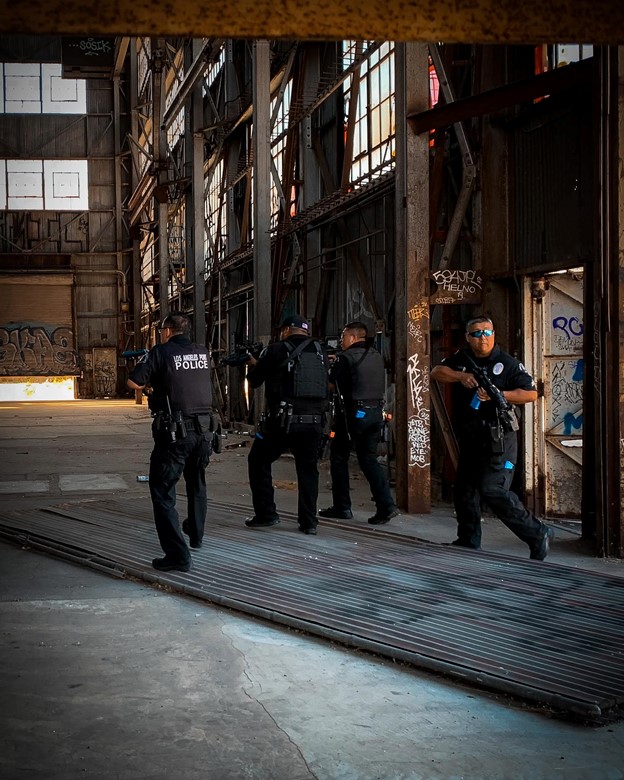
(Photo courtesy of the Los Angeles Port Police Department.)
Our patrol officers “conducted active shooter response training for officers. Training keeps our officers sharp and prepared to respond to calls for service in and around the Port of Los Angeles.” Those were the words accompanying the photo of cops training in clearing a port dwelling.
It has been my observation that small law enforcement entities may not have the budget to operate their own Marine Patrol unit. In the event police boats are needed for something, Mutual Aid Agreements include the larger, marine-equipped agency responding to the call(s) for help.
On that note, Marine Patrol contingents are usually prepped 24/7. If Marine cops are not already on the water vessel, take-home police cruisers get them to marina dockage in a jiffy, to board and respond to any unfathomable emergency.
Some law enforcement agencies are expressly relegated to policing waterfront properties and their super-busy maritime traffic. The Los Angeles Port Police Department is one such entity, with cops patrolling on water, walking a beat on docks, and sleuthing under piers, performing duties from national security risk assessments to liberating pelicans from fishing-line entanglements.
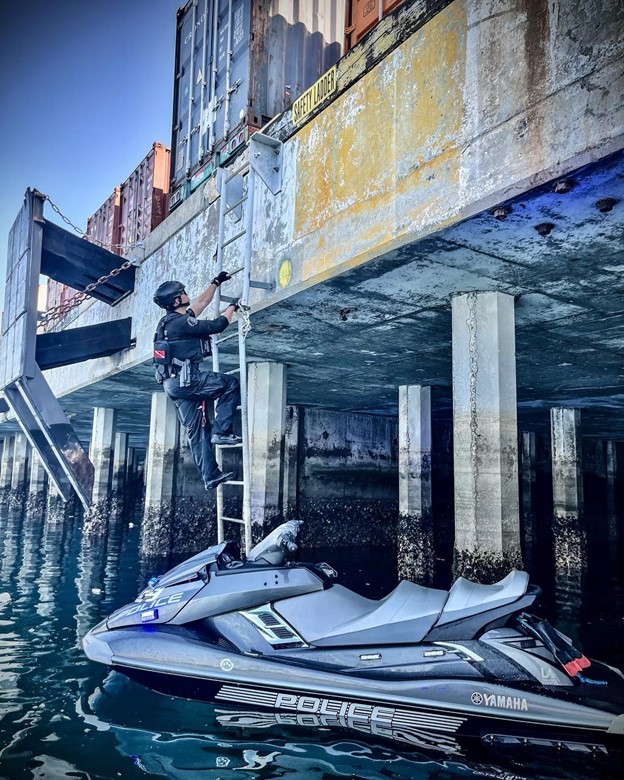
(Photo courtesy of the Los Angeles Port Police Department.)
Since our nation’s major ports are inundated with massive cargo ships laden with commodities from many foreign nations, port police entities receive federal funding so that maritime trade is as efficient as possible, with safety at the fore and mindfulness about merchant marines (civilian sailors) salivating over the idea of staying in America.
In a post-9/11 era, with the federal government authorizing gobs of funds toward law enforcement officers staffing every maritime port across the country on a 24/7 basis, I worked several dockside security details whereby commodities arriving from other nations, aboard ships flying foreign colors, were constant.
Beforehand, I was reminded that some of these foreign merchant marines may attempt to befriend me, hoping I’d give the nod for their foray “into town for some fun” while their ship was unloaded by U.S. citizens, perhaps never returning to their boat, becoming phantoms in our society.
Sure enough, various sailors tried me. Each was met with decline. Without relief from Port Security or a U.S. Department of Homeland Security officer, I held my own (and my bladder).
As one can imagine, the extraordinary stressors inherent in police work of any kind means outlets to offset the mental burdens and rollercoaster psyches are essential…like the Lee County Sheriff’s Office Marine Patrol Unit deputies did when they realized some playful dolphins had their back and shared some romp time in the wake.